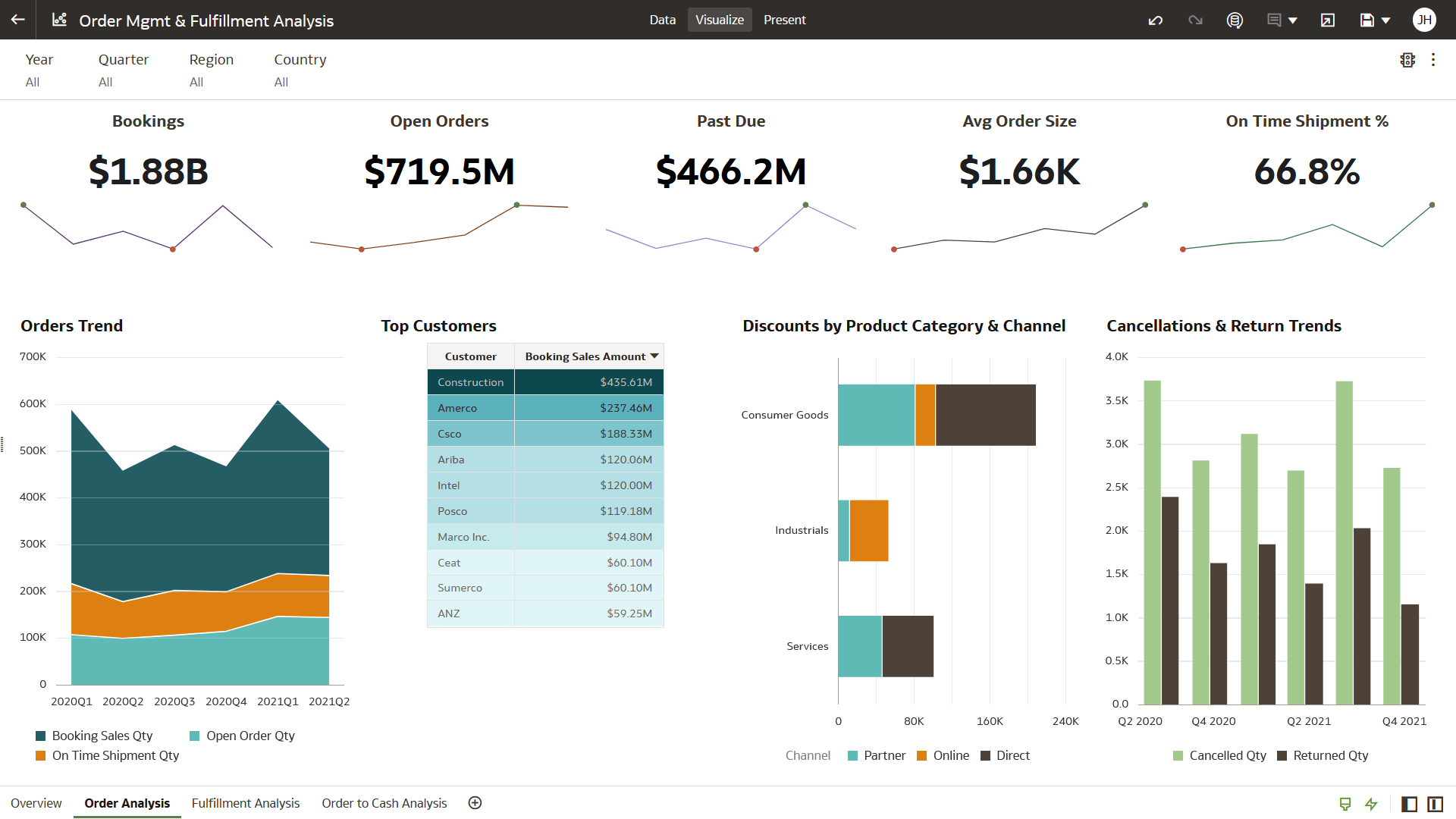Fusion SCM Analytics product tour
Improve the efficiency of your supply chain with prebuilt analytics

A prebuilt analytics solution for Oracle Fusion Cloud SCM
See how supply chain professionals can uncover ways to improve efficiency, increase revenue, reduce costs, and ensure customer satisfaction.
Click through this interactive tour of Oracle Fusion SCM Analytics to learn more.

Evaluate fulfillment and delivery performance
Order Management
Ensure customer satisfaction by tracking ready-to-use key performance indicators (KPIs) such as percentage of on-time delivery, perfect order, shipped-in-full, on-hold orders, and more.

Identify demand trends and order promise issues
Order Management
Analyze booking volume, backlog issues, and return reasons based on organization, customer, product, time, and order details to ensure customer satisfaction and revenue streams.

Discover bottlenecks in order-to-cash processes
Order Management
Improve process efficiency by analyzing key metrics such as DSO and order-to-invoicing cycle time.
Analyze bookings, revenue, and invoice amounts together for top customers and products for better decision-making.

Accelerate analyses of inventory balance and valuation
Inventory
Manage working capital and inventory turn by optimizing fill rates, identifying slow-moving items, and determining the best warehouse locations for high-demand products.
Track target service-level goals by evaluating inventory efficiency by item, category, or across locations.

Ensure alignment of stock levels with demand
Inventory
Gain visibility with a comprehensive view into global supply networks, internal and external stocking locations, and goods in transit.
Improve fill rates by tracking stock on hand at detail levels, such as SKU, category, and item location, to keep up with demand forecast and support anytime, anywhere fulfillment.

Understand costs and profitability at a granular detail
Inventory
Analyze production costs for work in process and finished goods, as well as the handling costs of merchandise inventory at granular detail for accurate valuations.
Identify cost-saving opportunities by examining cost details and trends for units, materials, overhead, labor, and handling.

Gain a deeper understanding of where costs incurred
Costing
Analyze cost distribution for a cost organization and cost book by period, transaction type, accounting line type, and items. Get insights such as COGS and purchase price variance by different dimensions and attributes.

Make more informed strategic decisions on pricing and profitability
Costing
Get detailed analysis into your COGS and gross margin metrics by channel, regions, and customer dimensions. Gain granular insights about your cost and margin elements.

Gain a holistic view of your work orders
Manufacturing
Get a summary-level analysis of your work order performance to easily identify trends in manufacturing cycle times and the root cause of deviations that impact yield with ready-to-use KPIs.

Drill down to the core reasons behind product quality issues
Manufacturing
Anyone can visually monitor day-to-day product quality by tracking patterns of scrapped, returned, cancelled, and reworked items to easily analyze their cause and effect on wastage.

Uncover cost-saving opportunities
Procurement
Develop long-term cost-saving strategies by monitoring the discounts you receive over time along with the savings potential by item.
Identify the root cause of lost discounts and unearth areas for spend consolidation by examining purchasing trends.

Minimize risk and improve supplier performance
Procurement
Analyze supplier performance against contractual obligations using prebuilt metrics, such as on-time delivery, rejected shipments, and return rates. Identify the root cause of poor performance to minimize disruptions to the business.

Drive procure-to-pay efficiency
Procurement
Understand procurement cycle times to ensure service-level compliance and fix operational bottlenecks that threaten productivity.
Easily analyze end-to-end finance and procurement data such as requisition and invoice/payments to determine the root cause of invoice holds and to ensure on-time payments to top suppliers.

Full visibility into spend
Spend
Quickly analyze spend across different categories, including business unit, geography, and cost center. Identify purchasing patterns and use them to develop strategies to consolidate suppliers or negotiate better pricing terms.
See the spend analytics product tour

Minimize rogue spend
Spend
Identify rogue spend to drive sourcing strategy adoption and negotiate the most competitive pricing terms with suppliers.
Example: A high rate of off-contract spend on laptops in certain countries indicates that there’s a potential opportunity to sign new suppliers in this region.
See the spend analytics product tour

Enrich your supply chain data with additional sources
Data extensibility
Extend analyses by leveraging more than 50 native, self-service connectors to access other Oracle and non-Oracle data sources.
For example, blend third-party corporate social responsibility (CSR) data into your analysis to ensure more effective supplier relationships and increase supply chain resiliency.

Uncover patterns in data with machine learning
Machine learning
Using embedded machine learning and predictive analytics, you can enhance supply chain forecasting, discover cost-savings opportunities, and understand inefficiencies in your fulfillment processes.

Understand the impact of supply chain operations on overall business goals
Cross-departmental
Eliminate data silos with a single, prebuilt, extensible data model for analytics across supply chain, finance, and HR.
Track supply chain KPIs together with HR and finance KPIs to understand their correlation.

Let Oracle help you navigate your analytics-driven journey
- Prebuilt, ready-to-go insights
- Unified, cross-departmental analytics data model
- Extensible to include any data